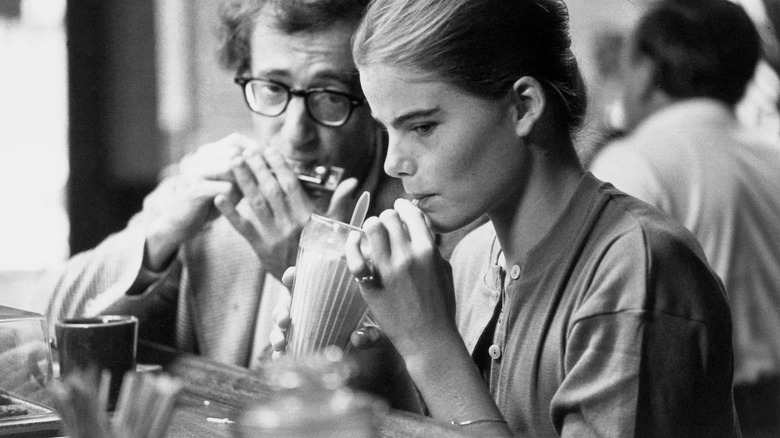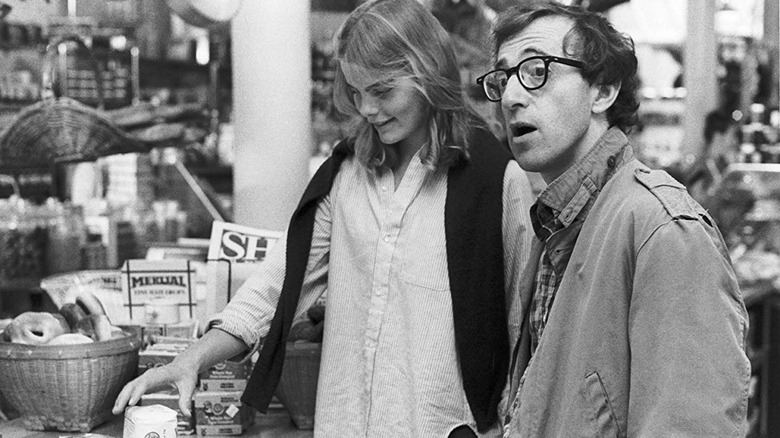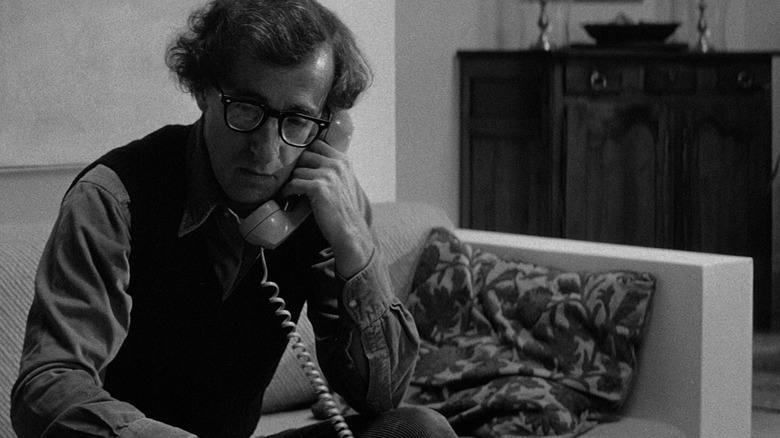Why Director Woody Allen Tried To Kill The Release Of His Movie Manhattan
Watching Woody Allen's 1979 romantic comedy "Manhattan" in 2024 is certainly a fraught affair. For decades after its release, "Manhattan" was hailed as one of the filmmaker's best, frankly and stylishly telling a story of modern New York life, revealing the embarrassing impulses of a neurotic man struggling through his own acknowledged sexual and romantic weaknesses. In the film, Allen plays Isaac, a 42-year-old, twice-divorced comedy writer trying to pen a book about how much he loves New York City. As part of his midlife crisis, he is romantically and sexually involved with Tracy (Mariel Hemingway), a 17-year-old prep school student.
Allen's fictional relationship with an underage girl was, at the time, seen as a strange quirk of the modern cosmopolitan arts milieu, and many critics remained unconcerned. It wouldn't be for a few more years, in 1991, that details of Allen's personal life would begin to emerge. He married the much-younger Soon-Yi Previn in 1997, a woman who was once his stepdaughter. The details of their affair came to light during a messy divorce with Mia Farrow in 1992. That same year, Farrow's daughter Dylan, would accuse Allen of sexual assault. The charges were dropped, but Dylan continued to repeat them for years.
The allegations were eventually enough to effectively blackball Allen from showbiz. Many people have spoken out about sexual abuse in Hollywood, and point to Allen as an example of powerful men who get away with crimes. Other celebrities have spoken out in support of Allen. However you feel, watching "Manhattan" is going to dredge up a lot of real-world unpleasantness. Allen is deeply hated.
In 2016, Allen spoke to The Hollywood Reporter, and surprisingly also expressed trepidation about "Manhattan." It seems he hated it so much that he once implored United Artists to not release it.
Woody Allen was 'very disappointed' with Manhattan
Allen, it should be noted, was always a very prolific filmmaker, having made at least one film every year from 1972 to 2017 (excepting '74, '76, and '81, although he made two movies in 1987). His most recent film was 2023's "Coup de Chance," which was made in France. Because he was so prolific, one can safely assume that he put out his fair share of duds; not all of Allen's films are notable classics or included on film school syllabi. Even Allen had admitted that he doesn't rewatch his own movies, preferring to make them rather than ponder how the last one came together.
When asked which film of his he wishes he could take back, Allen said that he would probably take back the vast bulk of his filmography. "There's probably six or eight of my films that I would keep," he said, "and you could have all the rest." He would keep "Zelig" (1983), "The Purple Rose of Cairo" (1985), "Husbands and Wives" (1992), "Match Point" (2005), and maybe "Midnight in Paris" (2011).
But not "Manhattan" or his best-received film, the Best Picture-winner "Annie Hall." In fact, he tried to get "Manhattan" destroyed when talking to Arthur Krim, the head of United Artists at the time. As Allen put it:
"I made them so long ago, I don't even remember them well. I don't have the same affectionate feeling for them as the public had. When I made 'Manhattan' and saw it, I was very disappointed at the time. And I spoke to Arthur Krim and said, 'If you don't put this film out, I will make a film for you for nothing.'"
Krim didn't take the deal, and "Manhattan" was released to much acclaim.
Woody Allen is now one of the most hated figures in Hollywood
Allen continued:
"[Krim] said: 'You're crazy. We like the film and we have an investment. We borrowed money to make [it]. We can't just spend a few million dollars and then not put a film out. It's insane.' So they put it out, and it was a very big success. I have often said, it's great luck, and we take credit for stuff that is out of our control."
The above quotes came from an interview in 2016, two years after Allen received a Golden Globe Cecil B. DeMille Award. In the wake of that award win, Mia Farrow and Ronan Farrow — Allen's biological son — objected heavily, and Dylan printed an open letter in the New York Times, repeating the sexual abuse charges from 1992. Allen was not in the public's best graces, but he hadn't yet been blackballed. That would happen in 2018 when Dylan wrote an op-ed for the Los Angeles Times wondering why the #MeToo movement hadn't included Allen. Since then, Allen has become one of the more hated figures in Hollywood, often included in conversation with Roman Polanski (who was actually arrested for sexual assault) and Kevin Spacey (who has been accused by over a dozen men of abuse and/or inappropriate, lascivious behavior).
Allen was once a darling of the Academy, beloved by critics, and called one of the more important filmmakers to have risen to fame in the 1970s. Now, no one can talk about him without mentioning the abused allegations.


